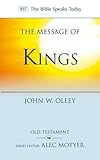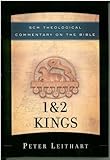 I must start by apologizing to my handful of readers for the long delay since my last post. The last few months I have been busy working on a few different projects (writing some software, and running a leadership training course), and so I had to put blogging to the side for a while. Here’s a review of a book I finished earlier this year but never got round to reviewing.
I must start by apologizing to my handful of readers for the long delay since my last post. The last few months I have been busy working on a few different projects (writing some software, and running a leadership training course), and so I had to put blogging to the side for a while. Here’s a review of a book I finished earlier this year but never got round to reviewing.
This is the most recent addition to the Bible Speaks Today series, which is now only a few volumes away from being completed. It’s a fairly substantial 374 pages, so there is good coverage of the text of the two books.
Olley describes Kings as a story of decline and complete reversal from the high point of Solomon’s peace and security. It is storytelling with a purpose: “Kings tells the story of the past so that, in light of Yahweh’s purposes and promises, people will change their lifestyles in the present.”
The introduction includes some helpful tables such as a list showing prophesies and their fulfilments (p31). “The Kings writer repeatedly reminds his hearers that it is Yahweh who is sovereign, his word is not sovereign”. Another helpful table (p36) visualises the kings of the North and the South, showing their timelines in relation to other key events.
Olley notes that although we call the book “Kings”, it is often prophets who take the lead. He makes an interesting contrast between David’s “wisdom” in 1 Kings 1 to kill his enemies, with the wisdom of God to benefit the powerless in 1 Kings 3. In 1 Kings 9, he is critical of the way Solomon focuses on gold, acting like the rulers of other nations, to earn their admiration.
Whilst he defends the historicity of the accounts, he does accept that some of the numbers are exaggerated, following the pattern of ancient Near Eastern “numerical hyperbole”.
In 1 Kings 2, he highlights a number of ways in which Elisha’s ministry foreshadows the compassionate ministry of Jesus. He has some interesting reflections on the difficult issue of violence in the name of God in 2 Kings 10 and some helpful material on idols in the section on 2 Kings 17.
As always, this BST volume will prove helpful for anyone studying or preaching their way through the book. Leithart’s commentary remains my favourite on 1 & 2 Kings, but the two are quite different in their approaches, so complement each other very well.
”

